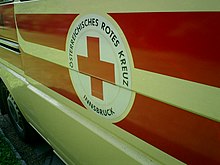
The International Red Cross and Red Crescent Movement is a humanitarian movement with approximately 97 million volunteers, members and staff worldwide, and was founded to protect human life and health, to ensure respect for all human beings, and to prevent and alleviate human suffering. Within it there are three distinct organisations that are legally independent from each other, but are united within the movement through common basic principles, objectives, symbols, statutes and governing organisations.

The Magen David Adom is Israel's national emergency medical, disaster, ambulance and blood bank service. The name means "Red Shield" or "Red Star of David". Since June 2006, Magen David Adom has been officially recognized by the International Committee of the Red Cross (ICRC) as the national aid society of the State of Israel under the Geneva Conventions, and a member of the International Federation of Red Cross and Red Crescent Societies. MDA has a dedicated medical emergency phone number in Israel, 101. MDA can become an auxiliary arm of the Israel Defense Forces during times of war. In 2022 MDA was academically affiliated with Ben Gurion University of the Negev.
The British Red Cross Society is the United Kingdom body of the worldwide neutral and impartial humanitarian network the International Red Cross and Red Crescent Movement. The society was formed in 1870, and is a registered charity with more than 17,200 volunteers and 3,400 staff. At the heart of their work is providing help to people in crisis, both in the UK and overseas. The Red Cross is committed to helping people without discrimination, regardless of their ethnic origin, nationality, political beliefs or religion. Queen Elizabeth II is the patron of the society.
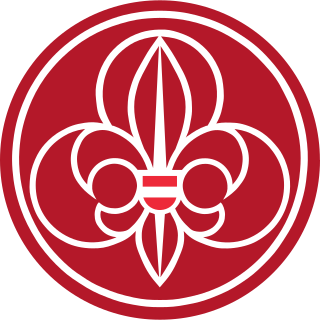
Pfadfinder und Pfadfinderinnen Österreichs is the largest Scouting and Guiding organization in Austria and the only one approved by World Association of Girl Guides and Girl Scouts (WAGGGS) and the World Organization of the Scout Movement (WOSM). The association claims more than 300 troops with more than 85,000 Scouts nationwide. WOSM and WAGGGS give quite smaller membership values for the PPÖ: 9,503 Scouts and 10,508 Guides.
Austrian car number plates are mandatory vehicle registration plates displaying the registration mark of motor vehicles in Austria. They are used to verify street legality, proof of a valid liability insurance and to identify and recognise the vehicle.
The German Red Cross is the national Red Cross Society in Germany.
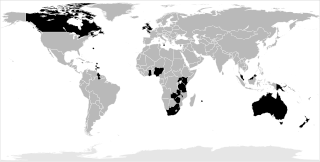
St John Ambulance is the name of a number of affiliated organisations in different countries which teach and provide first aid and emergency medical services, and are primarily staffed by volunteers. The associations are overseen by the international Order of St John and its priories.

Maria Theresa Henriette Dorothea of Austria-Este was the last Queen of Bavaria. She was the only child of Archduke Ferdinand Karl Viktor of Austria-Este and Archduchess Elisabeth Franziska of Austria.
The Bruno Kreisky Prize for Human Rights is a biennial award created in October 1976 on the occasion of the 65th birthday of Bruno Kreisky. The laureates are rewarded for their achievements in the field of human rights. The prize was divided in 1993 into a human rights prize and a prize in recognition of merit. The Bruno Kreisky Foundation for Human Rights has awarded in 14 conferments more than 130 individuals, institutions and human rights projects for outstanding services to the development and protection of international human rights and extraordinary achievements in the area of humanitarian aid. The prize winners are chosen both by the board of trustees of the Bruno Kreisky Foundation and by an international jury.

The International Federation of Red Cross and Red Crescent Societies (IFRC) is a worldwide humanitarian aid organization that reaches 160 million people each year through its 192-member National Societies. It acts before, during and after disasters and health emergencies to meet the needs and improve the lives of vulnerable people. It does so with impartiality as to nationality, race, gender, religious beliefs, class and political opinions.
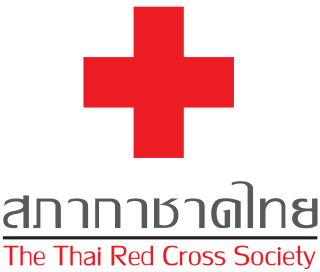
The Thai Red Cross Society is a major humanitarian organisation in Thailand, providing services as part of the International Red Cross and Red Crescent Movement.
The Swiss Red Cross, or SRC, is the national Red Cross society for Switzerland.

The Finnish Red Cross is an independent member of the International Federation of Red Cross and Red Crescent Societies, which is one of the biggest and best-known international organisations in the world and in the field of humanitarian aid. FRC has over 90,000 members and around 45,000 active volunteers in Finland. FRC consists of 12 regional chapters and 550 local branches throughout the country. The current General Secretary is Ms. Kristiina Kumpula. At the end of 2006, the FRC employed 1,168 people, of which 136 worked at the headquarters in Helsinki.
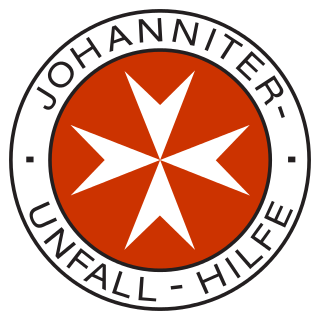
Johanniter-Unfall-Hilfe e.V., commonly referred to as Die Johanniter, is a voluntary humanitarian organisation affiliated with the Brandenburg Bailiwick of the Order of St John, the German Protestant descendant of the Knights Hospitaller. The organisation was founded in 1952 in Hanover under the leadership of Rudolf Christoph Freiherr von Gersdorff. One of the main reasons for its creation was the rise in injuries and deaths from road traffic accidents. JUH participates in international aid efforts together with its sister organisations in other countries as part of the Johanniter International partnership; it also works with the German Malteser Hilfsdienst, affiliated to the Catholic Sovereign Military Order of Malta. As of 2017 the organisation had 37,000 active volunteers and youth members and around 1,300,000 registered members.

The Verein für Deutsche Kulturbeziehungen im Ausland, abbreviated VDA, is a German cultural organisation. During the Nazi era it was engaged in spying across the whole world, using German minorities living in other countries. Its other goals included preservation of German culture among "racial Germans".

The Karl Troop Cross was instituted on 13 December 1916 by Emperor Karl I of Austria-Hungary. The cross was awarded for service up to the end of the First World War to soldiers and sailors of all arms of the Austro-Hungarian armed forces, regardless of rank, who had been with a combatant unit for at least twelve weeks and who had participated in at least one battle. Members of the air service who made ten flights over enemy lines were also eligible.
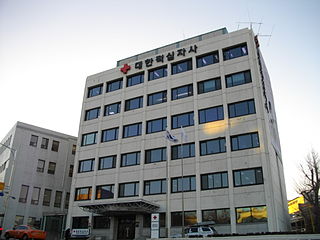
The Republic of Korea National Red Cross is a humanitarian organization that provides emergency assistance, disaster relief and education inside South Korea. It is the designated South Korean affiliate of the International Federation of Red Cross and Red Crescent Societies.

Emergency Medical Service in Austria is a service of public pre-hospital emergency healthcare, including ambulance service, provided by individual Austrian municipalities, cities and counties. It is primarily financed by the Austrian health insurance companies.

Prince Aloys Franz de Paula Maria, known in English as Prince Louis was an Austrian politician and member of the House of Liechtenstein. He was a deputy in the Austrian Imperial Council from 1878 to 1889 and 1891 to 1911. From 1910 to 1918 he chaired the Christian Social Party, in 1912 he was appointed to the House of Lords. His commitment to social reforms in the spirit of the "Workers' Pope" Leo XIII and his social encyclical Rerum novarum earned him the nickname "Red Prince".
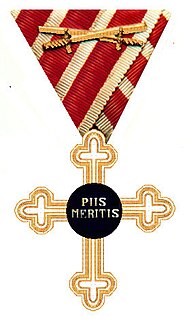
This is a list of Orders, decorations, and medals of Austria-Hungary.

